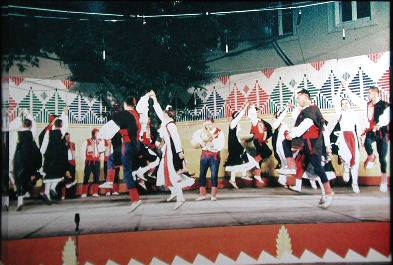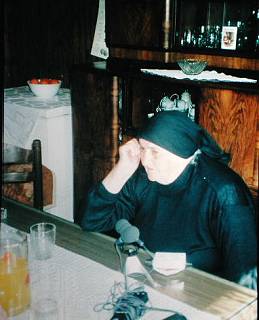| In many important respects
music is both economic and ideological practice. The
process of changes in music, the economy and ideology is
characterized by tension and struggle, acquiescence and
resistance, progress and loss (Rice, 1998:169). Changes
in the music system of Dalmatian Hinterland during the
20th century occurred parallely with economic and
ideological changes. The economic changes can be seen in
the transformation of a cattle-breeding population living
in pleme [tribal, clan] communities into a working
class or peasant population living in separate families. Over the last century only, three major wars swept through these regions, changing borders, relations between the ethnic communities, and the state systems.
The last war conflict - Domovinski rat (The Homeland War) - marked the independence of the Croatian state, setting new borders and making changes in the economic system. The imposition of Marxist ideology and its associated economic practice in the socialist Yugoslavia, established after World War II, provided an almost inescapable interpretative frame within which to analyze the social maintenance of music practice. Traditional music was interpreted by musicologists "as a cultural phenomenon existing as a thing in itself, a self-contained system, a kind of action autonomous, used at the same time within the political system as a symbolic tool for ideological manipulation" (Petrovic, 1995:60). Music-making from the Dalmatian Hinterland received a negative connotation. According to Ankica Petrovic, widespread cultural prejudice against the ganga and other rural forms was reinforced by politicians and officials whose retorics of prosperity and development were in contradiction with primitive and archaic ganga . Petrovic's choice of the ganga as her research subject was "declared to be an inappropriate topic for study abroad" (7) (Petrovic, 1995:61). Socialist economic practice had industrialization and urbanization as its main objective in creating the new socialist entity, and this resulted in the construction of numerous factories in the towns and cities. Industrialization and urbanization of the coastal strip, and particularly the development of tourism, led to sudden resettlement of people from the Hinterland who moved to the coast in search of a more prosperous and acceptable way of life. At the same time, the western European countries were in great demand of unqualified or poorly qualified labor which led to migrant workers moving "temporarily" (8) to the lands of western Europe (particularly to Germany). When migrating from their villages to the cities, mostly on the coast (and not vice-versa), people believe that they are moving to something "better (...), more modern, and more western, in comparison to their own heritage (Pettan, 1997). Emphasizing western values, referred to as Mediterraneanisation by S. Pettan, this happens "at the expense of their cultural traits, here synonymous with the Hinterland heritage" (Pettan, 1997).
Older and simpler archaic forms which were preferred in the past are now being surpressed. Although in the 1960’s (Bezic, 1968:175) unison samacko putnicko [lone travellers] singing or two-part singing were quite well represented forms, today we can only find traces of such singing, usually performed by older people, after persuading, because such singing is no longer practiced. When describing this way of singing the singers usually use the adjectives old, ancient. The difference which existed in the past between male and female singing, today is unrecognizable, because it happens that due to the lack of knowledge of the ways of singing some performers, especially men, start singing in the female way. We have the same situation with the repertoire of narrative songs of open structure, which was a dominant form of communication among the population of Dalmatian Hinterland until the appearance of the media. The name for the way of singing of longer narrative songs without instrumental accompaniment - pivanje iz kape [singing from the hat], pivanje iz knjige [singing from the book] - derives from the fact that the singer holds a hat or a closed book in his hand during the singing. The narrative songs of these, regularly illiterate singers, were about historic events, heroes and outlaws (hajduci) (9) but also about contemporary events, mostly about blodsheding tragedies composed at the beginning of the 20th century. In my research, I have had the custom to mention, in an informal situation, just the opening line of the most popular of the "newer" narrative songs, the so called "Rosanda". After my calling the opening verse "Divno brdo Biokovo…" there were always individuals who would continue singing or reciting the song . This way of communication has made it possible for me to have an excellent further communication with the singers, who after that began to trust me completely. It was obvious that they missed singing this repertoire, although they were aware of the fact that an environment which had cherished such singing nowadays rarely exists, or does not exist at all. |

